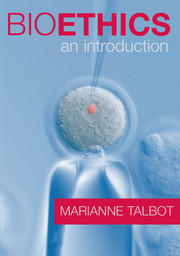Bioethics An Introduction
Langue : Anglais
Auteur : Talbot Marianne

This book clearly explains bioethical issues and their philosophical foundations to science students, encouraging critical thinking about the ethics of biotechnology.
Providing readers with the confidence needed to debate key issues in bioethics, this introductory text clearly explains bioethical theories and their philosophical foundations. Over 250 activities introduce topics for personal reflection, and discussion points encourage students to think for themselves and build their own arguments. Highlighting the potential pitfalls for those new to bioethics, each chapter features boxes providing factual information and outlining the philosophical background, along with detailed case studies that offer an insight into real-life examples of bioethical problems. Within-chapter essay questions and quizzes, along with end-of-chapter review questions, allow students to check their understanding and to broaden their thinking about the topics discussed. The accompanying podcasts by the author (two of whose podcasts on iTunesU? have attracted over 3 million downloads) explain points that might be difficult for beginners. These, along with a range of extra resources for students and instructors, are available at www.cambridge.org/bioethics.
Preface; Using this book; Notes for instructors; Part I. Bioethics and Ethics: 1. Biotechnology and bioethics: what it's all about; 2. Ethics in general: ethics, action and freedom; 3. Ethics in the context of society: ethics, society and the law; 4. Ethical theories: virtue, duty and happiness; 5. Identifying and evaluating arguments: logic and morality; 6. General arguments: unnatural, disgusting, risky, only opinion; Part II. The Beginning and End of Life; Section 1. Cloning: 7. Therapeutic cloning: the moral status of embryos; 8. Reproductive cloning: science and science fiction; Section 2. Reproduction: 9. Reproductive freedom: rights, responsibilities and choice; 10. The resources of reproduction: eggs, sperm and wombs for sale; 11. Screening and embryo selection: eliminating disorders or people?; Section 3. Ageing and Death: 12. Ageing and immortality: the search for longevity; 13. Death and killing: the quality and value of life; Part III. In the Midst of Life; Section 1. Our Duties to Ourselves: 14. Human enhancement: the more the better?; 15. Bio-information: databases, privacy and the fight against crime; 16. Security and defence: security sensitivity, publication and warfare; Section 2. Our Duties to Each Other: 17. Food and energy security: GM food, biofuel and the media; 18. Bio-ownership: who owns the stuff of life?; 19. Human justice: the developed and developing worlds; Section 3. Our Duties to Nature: 20. Non-human animals: consciousness, rationality and animal rights; 21. The living and non-living environment: spaceship Earth; Index.
Marianne Talbot has been Director of Studies in Philosophy at Oxford University's Department for Continuing Education since 2001, where she is responsible for the university's lifelong learning in philosophy. Talbot pioneered Oxford's popular online short courses and has more recently specialised in teaching ethics to scientists. She teaches ethics for doctoral training centres in Oxford and in London and has trained the EPSCR itself in ethics.
Date de parution : 05-2012
Ouvrage de 478 p.
19.4x25.3 cm
Date de parution : 05-2012
Ouvrage de 476 p.
18.9x24.6 cm
Thème de Bioethics :
© 2024 LAVOISIER S.A.S.



